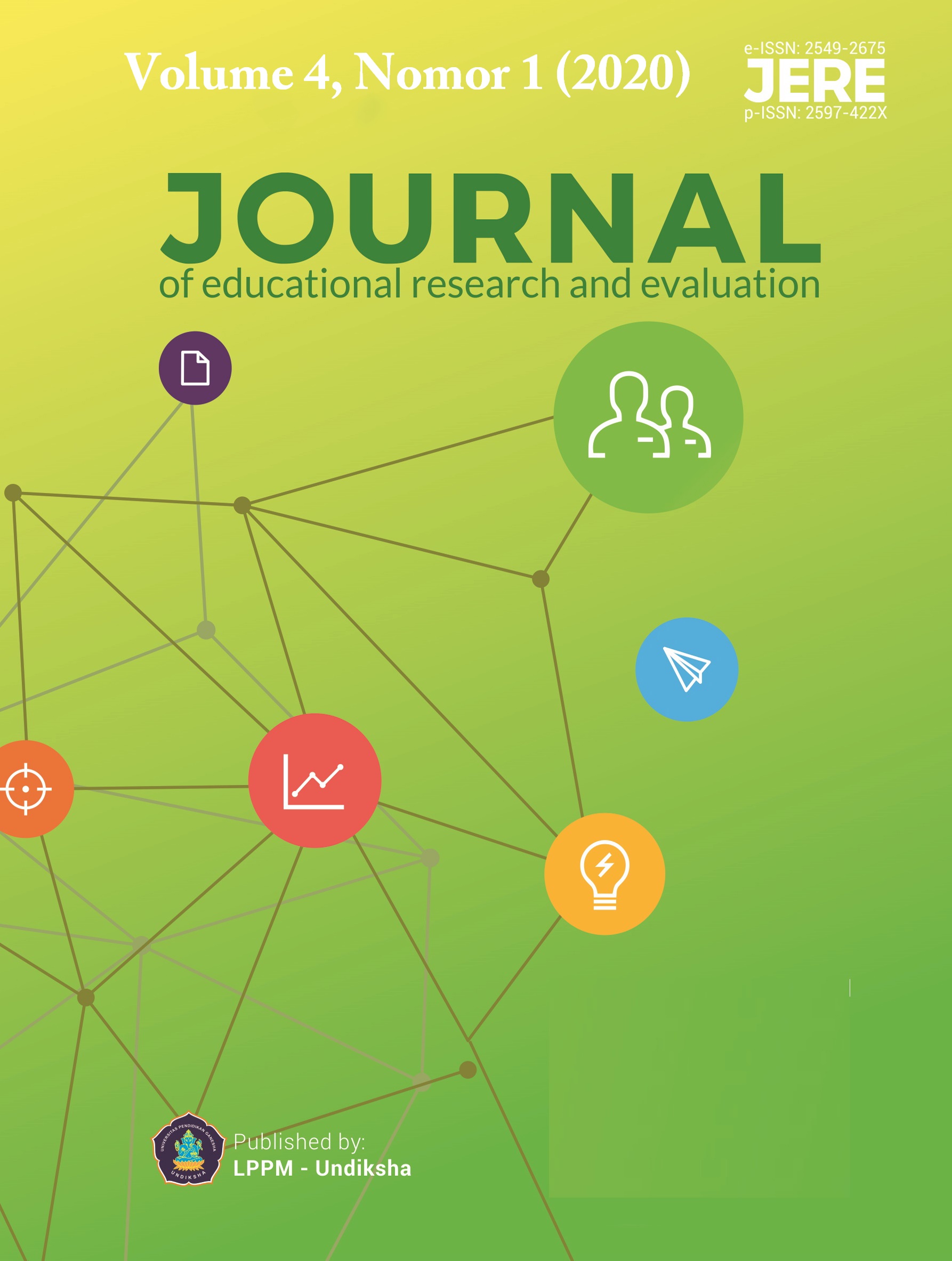Building Characters of Primary School Students Through Lagu Dolanan Anak (Kid’s Playing Songs) by Using The Role-Playing Method
DOI:
https://doi.org/10.23887/jere.v4i1.23324Kata Kunci:
role-playing method, lagu dolanan, characters buildingAbstrak
Lagu dolanan anak as one form of culture that can be used as a means of conveying advice so that it is often assumed to be used as a means of character building in children. A form of preservation of lagu dolanan anak can be done through learning by using effective methods in achieving learning objectives. In this case, the purpose of learning lagu dolanan anak with the role-playing method was to understand the meaning of playing songs through learning activities of art and culture skills, with music art materials. Lagu dolanan anak studied wereAna Tamu, Cublak-Cublak Suweng, Dondhong Apa Salak, and Kuwi Apa Kuwi. The lyrics of those playing songs have been analyzed to have positive character values that are right taught to children. Through descriptive analytic from the facts, nature, the relationships between those lagu dolanan anak, role-playing learning method, and early characters building to studentswere described systematically, factually, and accurately. Learning lagu dolanan anak songs through the role-playing method contains nine-character values, namely independence, honesty, discipline, tolerance, hard work, creative, respect for achievement, and responsibility.
Referensi
A.L.,Hughes.(1999). Psikologi Anak (Children, Play, and Development). Jakarta: Penerbit Gramedia.
Berkowitz, M.W. (2002). The Science of Character Education. In W. Damon (Ed.) Stanford CA: Hoover Institution Press
Danandjaja, James. (1984). Folklor Indonesia; Ilmu Gosip, Dongeng, Dan Lain-lain. Jakarta: PT Pustaka Utama Grafiti
Eskasasnanda, I Dewa Putu. (2017). “Causes and Effects of Online Video Game Playing among Junior-Senior High School Students in Malang East Java.” International Journal of Indonesian Society and Culture 9(2), 191-202
Hamalik, Oemar. (2001). Proses Belajar Mengajar. Jakarta : Bumi Aksara
Lew, J. C.-T., Campbell, P. S. (2005). “Children’s natural and necessary musical play: Global contexts, local applications.” Music Educators Journal, 91(5), 57-62.
Lickona, Thomas. (1991). Educating for Character: How Our School Can Teach Respect and Responsibility. New York, Toronto, London, Sydney, Aucland: Bantam books
Mahmud, A. T. (1995). Musik dan Anak. Jakarta: Departemen Pendidikan dan Kebudayaan
Megawangi, Ratna. (2010). Pendidikan Karakter Solusi yang Tepat untuk Membangun Bangsa. Jakarta: IHF (Indonesia Heritage Foundation).
Overbeck, H. (1939). Javaansche Meisjesspelen en Kinderliedjes [Javanese children’s and girls’ singing games].Yogyakarta, Indonesia: Java-Instituut.
Sarwono, E. (1995). Tuntunan Tembang Jawa kangge Para Siswa Sekolah Dasar Kelas 3, 4, 5, lan 6. Semarang: Anugrah
Septania, Rizky C. (2018). "Kecanduan Main Game Kini Masuk Kategori Gangguan Mental". https://tekno.kompas.com
Soedarsono. (1985). Sejarah Kehidupan Manusia. PidatoPengukuhan Guru Besar. Yogyakarta
Spradley, James. P. (2007). Etnographic Interview. Yogyakarta: PT Tiara Wacana.
Suwarna & Suwardi. 1996. Integrasi Pendidikan Budi Pekerti dalam buku teks “Tataran Wulang Basa Jawa Kanggo SD.” Laporan Penelitian Yogyakarta. Lemlit, IKIP
Winarti, Daru. (2010). “Lirik Lagu Dolanan Sebagai Bentuk Komunikasi Berbahasa Jawa: Analisis Fungsi.” Dalam Widyaoarwa, Vol 38 (1)
Unduhan
Diterbitkan
Cara Mengutip
Terbitan
Bagian
Lisensi
Authors who publish with the Journal of Evaluation and Research in Education (JERE) agree to the following terms:
- Authors retain copyright and grant the journal the right of first publication with the work simultaneously licensed under a Creative Commons Attribution License (CC BY-SA 4.0) that allows others to share the work with an acknowledgment of the work's authorship and initial publication in this journal.
- Authors are able to enter into separate, additional contractual arrangements for the non-exclusive distribution of the journal's published version of the work (e.g., post it to an institutional repository or publish it in a book), with an acknowledgment of its initial publication in this journal.
- Authors are permitted and encouraged to post their work online (e.g., in institutional repositories or on their website) prior to and during the submission process, as it can lead to productive exchanges, as well as earlier and greater citation of published work. (See The Effect of Open Access)











